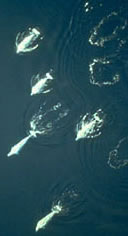 |
 |
|
Cook Inlet Beluga WhalesThe word beluga comes from the Russian word for white. Calves are born in the summer and are dark to brownish gray and get lighter as they get older. The adults are white in color. The belugas in the Cook Inlet are now protected under the Endangered Species Act (2008). In 1979 there were 1,300 whales and the 2007 estimate is 375. See 2009 beluga whale research results
Cook Inlet belugas eat mostly hooligan or candlefish in the spring and switch to eating mostly salmon in the summer months. They also enjoy eating squid, shrimp, flounder, octopus, clams, mussels, snails, sandworms, pollock and ling cod. They have 32 – 40 teeth but swallow their food whole. They hunt in the shallow water near the coasts allowing for great viewing opportunities by local whale watchers and tourists alike. Average adults belugas are 12-14 feet long and weight about 3,000 pounds. They have blunt noses, stout bodies with a bump on top of their head. They are slow swimmers and move at about 5 MPH most of the time reaching top speeds of 11 MPH. They live in groups anywhere from 5 to a hundred. They make whistling sounds that are like the song of a bird. They whistle through their blowhole while underwater but the sounds are loud enough to be heard above the water.
Where To See Whales In Alaska.Additional Reading: |


 Cook
Inlet belugas live in the inlet year round. From spring through fall the belugas can be
found in the upper inlet river and bays (Turnagain and Knik Arms) near the city of Anchorage.
In the spring and summer months they can also be found from Turnagain Arm south to the
mid-inlet region near the coastal community of Kasilof. They concentrate in areas of shallow
tidal flats, larger river mouths and areas where contacts with humans are low. During
the fall and winter months they move further south to Kachemak Bay near Homer and to the
Barren Islands at the beginning of the Cook Inlet. Ice provides protection from beluga
predators.
Cook
Inlet belugas live in the inlet year round. From spring through fall the belugas can be
found in the upper inlet river and bays (Turnagain and Knik Arms) near the city of Anchorage.
In the spring and summer months they can also be found from Turnagain Arm south to the
mid-inlet region near the coastal community of Kasilof. They concentrate in areas of shallow
tidal flats, larger river mouths and areas where contacts with humans are low. During
the fall and winter months they move further south to Kachemak Bay near Homer and to the
Barren Islands at the beginning of the Cook Inlet. Ice provides protection from beluga
predators.